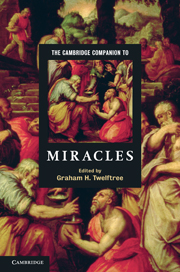Book contents
- Frontmatter
- Introduction
- Part I Fundamental issues
- Part II Miracles in antiquity and the Middle Ages
- Part III Miracles and major religions
- 9 Miracles in traditional religions
- 10 Miracles in Hinduism
- 11 Miracles in Islam
- 12 Tales Of Miraculous Teachings: Miracles In Early Indian Buddhism
- 13 Miracles in Christianity
- 14 Miracles in Jewish philosophy
- Part IV Miracle today
- Index
13 - Miracles in Christianity
from Part III - Miracles and major religions
Published online by Cambridge University Press: 28 May 2011
- Frontmatter
- Introduction
- Part I Fundamental issues
- Part II Miracles in antiquity and the Middle Ages
- Part III Miracles and major religions
- 9 Miracles in traditional religions
- 10 Miracles in Hinduism
- 11 Miracles in Islam
- 12 Tales Of Miraculous Teachings: Miracles In Early Indian Buddhism
- 13 Miracles in Christianity
- 14 Miracles in Jewish philosophy
- Part IV Miracle today
- Index
Summary
The testimony to miracles has never been absent from Christianity although the theological and philosophical understanding of them has varied over the centuries. Whether they have been significant or marginal to the life of the church has in part been determined by popular piety, religious aspirations and expectations, and the judgment rendered about them in teaching, preaching and theology. There is a considerable difference at these levels, for example, between a Presbyterian parish schooled in the cessationist theology of certain forms of Calvinism and that of a Pentecostal congregation whose very existence is informed by the conviction that the extraordinary events of Pentecost continue in the life of the church. Here we may distinguish between affirmations of the miraculous in the witness of Holy Scripture to which both congregations would assent, and the belief that miracles have ceased or indeed still occur. Add to this the additional challenge that with the emergence of modernity in Western culture the former would come under scrutiny as well, it becomes clear that to speak of miracles is a complicated matter for many a Christian.
An important distinction is also in order. Miracles fit into the category of the extraordinary course of religious events. How this differs from ordinary religious events is also a matter of some debate, especially if religious experiences are considered as operations of divine grace. Therefore, the healing story of Jesus and the paralytic in the synoptic gospels (Matt. 9.1–8; Mark 2.1–12; Luke 5.17–26) poses the perennial question to faith, in the words of Jesus following his declaration of the forgiveness of sins: ‘Which is easier to say to the paralytic, “Your sins are forgiven”, or to say, “Rise, take up your pallet and walk”?’ (Mark 2.9).
- Type
- Chapter
- Information
- The Cambridge Companion to Miracles , pp. 235 - 253Publisher: Cambridge University PressPrint publication year: 2011
- 3
- Cited by



